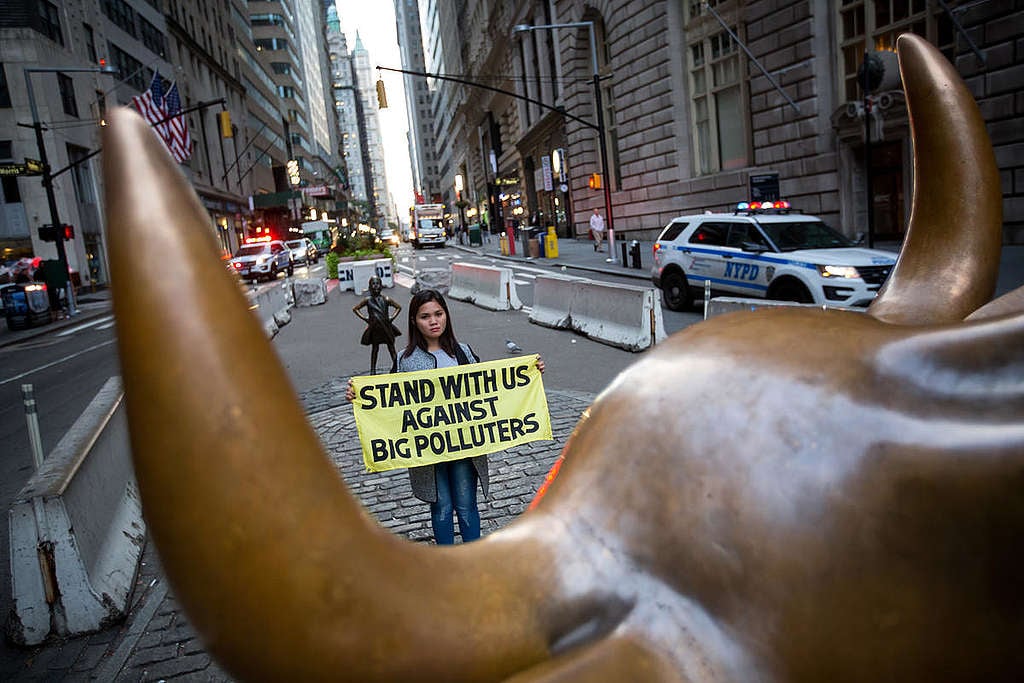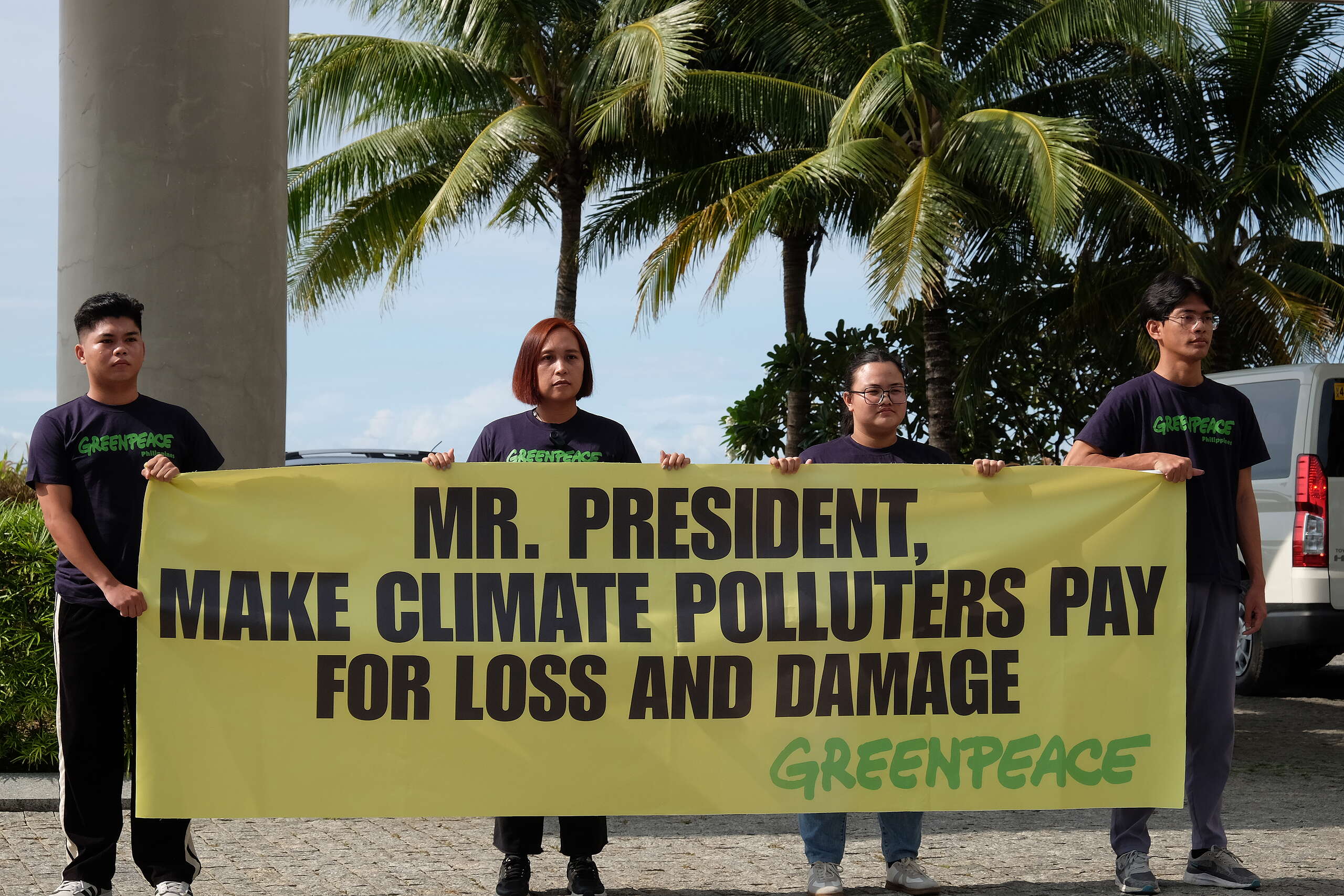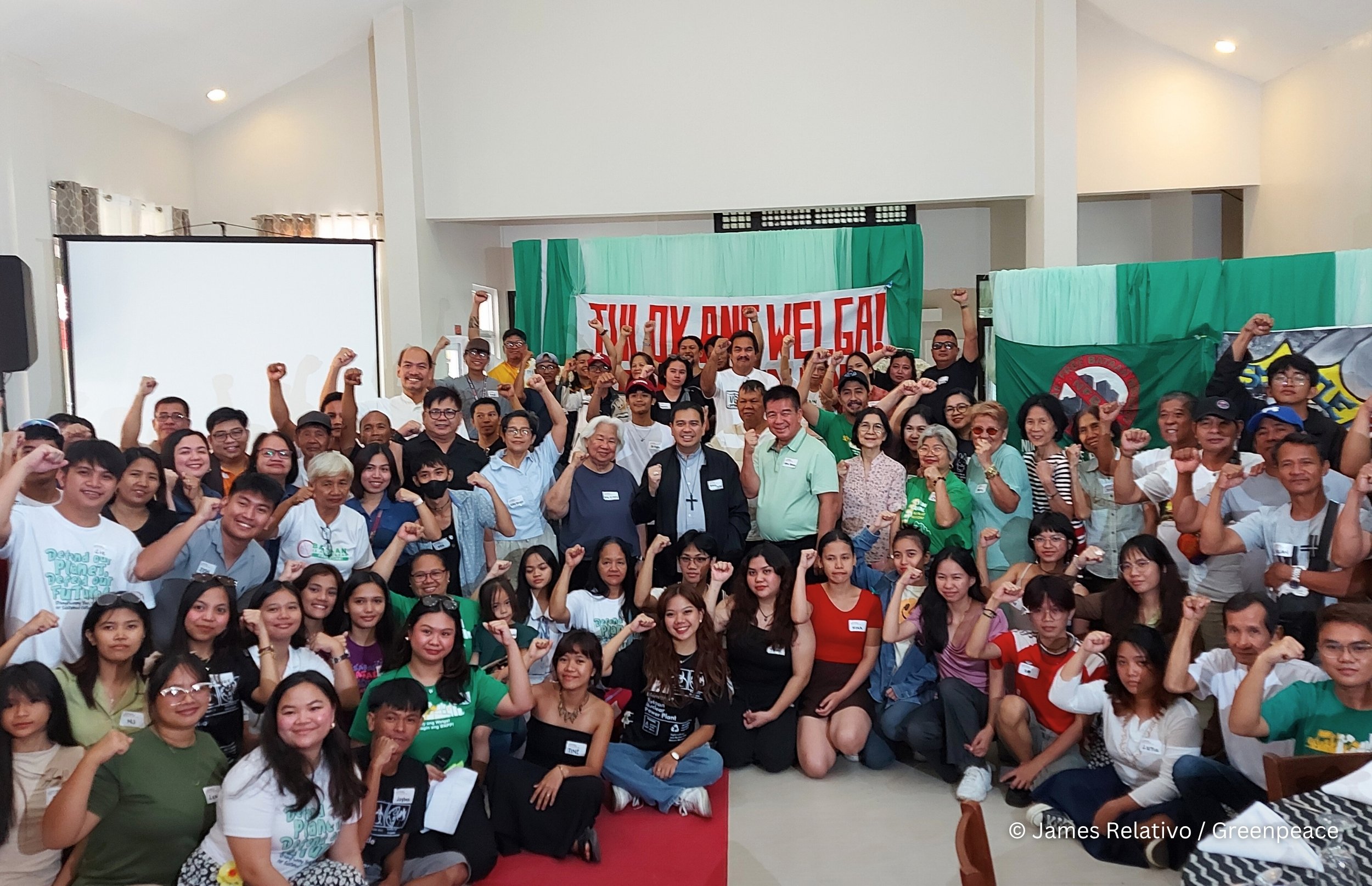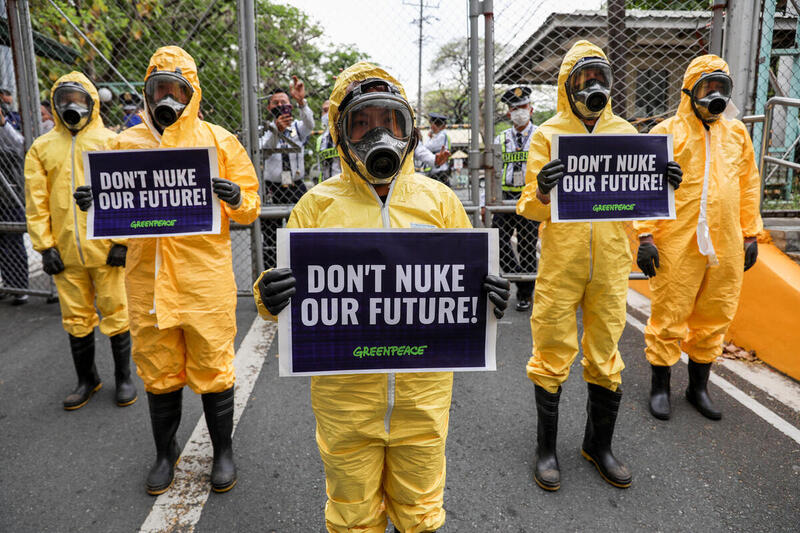With this reply, the petitioners are challenging CEOs of the largest carbon producers to be a part of the solution by fully participating in the national inquiry. The companies are using ‘courtroom tactics’ in an effort to evade public scrutiny of their business activities that are contributing to human rights harms. The Commission has full authority to investigate human rights harms occurring in the Philippines, including impacts resulting from companies’ global activities. Considering that the Philippines is one of the most vulnerable countries to climate change, the petitioners will not back down.
“Petitioners request the representatives of the companies to attend the public hearings and present their plans for phasing out fossil fuels in order to prevent future human rights harms resulting from the impacts of climate change,” said Yeb Saño, Executive Director of Greenpeace Southeast Asia and petitioner.
Typhoon survivors, community and civil-society organizations and notable individuals, petitioned the Commission for the investigation in 2015, two-years after super-typhoon Yolanda (Haiyan) claimed the lives of more than 6,300 people and affected millions of others who have yet to recover (2). Their aim is to prevent further human rights harms being endured by Filipinos (3). Now more than ever there needs to be a determination on whether some of the world’s most profitable and powerful, yet polluting, companies are failing to fulfill their responsibilities to respect human rights. Despite knowing the severe risks posed by climate change for decades (4), the fossil fuel industry continues to extract and sell oil, coal and gas, which, when used, results in significant amounts of climate change-causing greenhouse gas emissions.
The Petitioners believe this is unacceptable and are asking the Commission to weigh in on the climate crisis. In July 2016, the Commission issued an Order to the 47 “Carbon Major” companies (5), which were identified by peer-reviewed research to have collectively and individually made the most significant corporate contribution to climate change (6).
Twenty-one companies have so far responded to the Petition, either to the Commission, the petitioners or, informally, to the NGO Business & Human Rights Resource Centre (BHRRC), including: ExxonMobil Petroleum & Chemical Holdings, Inc. Philippine Branch, Shell Company of the Philippines, Ltd., and Royal Dutch Shell plc. Only one company, Rio Tinto, properly acknowledged the ‘fact-finding’ nature of the investigation (7).
“All the responses received so far fail to address the heart of the matter: the companies’ responsibility for the disastrous consequences that climate change has on the lives and livelihoods of Filipinos. These companies must exercise due diligence in determining how to prevent their business activities from worsening the impacts The companies say a lot of good things on paper about reducing emissions and respecting human rights. If they really mean it, they will show up and take part in the national public inquiry,” added Saño. “We will not accept silence from the companies and will continue to press for answers.
In December 2016, the Commission confirmed that it would push ahead with the national inquiry and proceed with planned public hearings in Manila, as well as in communities that have suffered the impacts of devastating storms. The Petitioners anticipate that the hearings will begin in April or May this year.
To date, over 120,000 people around the world have pledged their support for this ground breaking legal action to champion human rights through climate justice by signing the online campaign that petitioner Greenpeace launched in June 2015. The petitioners, other activists from the Philippines and from around the world will come together in Tacloban, the city hit hardest by super-typhoon Yolanda, at the end of March to remind people of the power, strength and solidarity within and across communities globally to protect our human rights to a stable climate and healthy environment.
Notes for Editors:
1) Petitioners’ consolidated reply. Petitioners include 18 Filipinos living on the frontlines of climate change. They are joined by 14 civil society organizations based in the Philippines, including Greenpeace Southeast Asia (Philippines).
2) Final Report on Effects of Typhoon “Yolanda” (Haiyan) (PDF) (Report). The Philippine National Disaster Risk Reduction and Management Council. December 11, 2015. Archived from the original on May 6, 2016. https://www.greenpeace.org/static/planet4-philippines-stateless/2019/05/8006f16f-8006f16f-final_report_re_effects_of_typhoon_yolanda_haiyan_06-09nov2013.pdf
3) Petition Requesting for Investigation of the Responsibility of the Carbon Majors for Human Rights Violations or Threats of Violations Resulting from the Impacts of Climate Change, 9 May 2016, http://www.greenpeace.org/seasia/ph/PageFiles/735232/Climate_Change_and_Human_Rights_Petition.pdf
4) See opinion of the Center for International Environmental Law. It provides a brief synthesis of knowledge available to major carbon producers, the early opportunities that knowledge created to reduce or mitigate the climate risks arising from their products, services, and business operations, and how individual companies and the Carbon Majors as a group responded to those opportunities. It then addresses the significance of those findings to the question of the responsibility of the Carbon Majors for the violations or threatened violations of human rights in the Philippines. In addition, a number of international experts have made amicus submissions to the Commission: https://business-humanrights.org/en/amicus-briefs
5) Greenpeace Southeast Asia, Briefing Paper: Who is responsible for increasing the risks of climate change? updated on 14 February 2017.
6) In total, 21 companies responded either to the Petitioners and Commission (14 responses) or Business & Human Rights Resource Centre (11 responses). Four companies responded to the petitioners, Commission, and Business and Human Rights Resource Centre. For an overview of all responses, please see Annex A to the Consolidated Reply. BHRRC, an independent non-profit, is a well-established clearinghouse for information on business and human rights that is respected by companies, governments, civil society, media and investors. BHRRC invited forty-five (45) respondents to share responses submitted to the Honorable Commission in accordance with the 21 July 2016 CHR Order: https://www.greenpeace.org/static/planet4-philippines-stateless/2019/05/493bf20f-493bf20f-annex_a_overview_of_corporate_responses.pdf
7) For more information on the people-powered actions around the world, please see http://www.peoplevsbigpolluters.org.
Media Contacts:
Amalie Conchelle C. Hamoy-Obusan, Country Director Greenpeace Southeast Asia (Philippines)
Email: [email protected] | Tel.: +63 998 5870336
Zelda Soriano, Legal and Political Advisor, Greenpeace Southeast Asia
Email: [email protected] | Tel. +639175949424
Kristin Casper, Litigation Counsel, Climate Justice and Liability Project, Greenpeace Canada (based in Toronto)
Email: [email protected] | Tel. +1 (416) 889-6604
JP Agcaoili, Communications and Digital Manager, Greenpeace Southeast Asia (Philippines)
Email: [email protected] | Tel. +639498891334

Filipinos are enduring the worst impacts of climate change, caused by greedy corporations. It’s time to hold them to account!
TAKE ACTION


